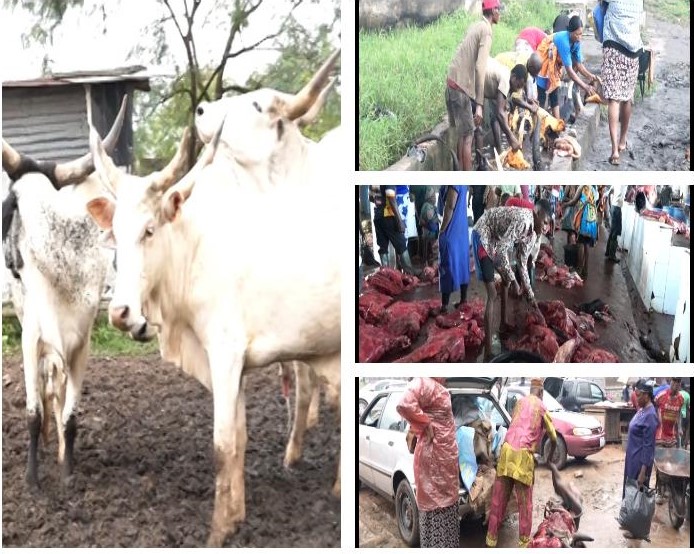By The9JTREND
According to nutritionists, meat is a nourishing health food that provides body with protein, vitamins and minerals. Meats in diet make our diets balanced. Even though it’s not the only source of protein in our diet, it provides us with iron, zinc and B minerals that make for the proper functioning of our body.
However, hygiene is important when preparing storing and conveying meat from where cows are slaughtered to the market place from where they are sold to the general public for consumption.
Experts say consumption of harmful meat has implications for the health of the people. They say from results, eating meat infested with diseases such as tuberculosis can be transferred to humans.
With these facts at our disposal The9JaTREND team undertook a visit to abattoirs located at the Ikpoba Slope area of Benin City, Edo State capital to ascertain its state of hygiene and to find out the current state of readiness to serve the people with a view to curb the upsurge of communicable and some neglected tropical diseases.
At the Government Abattoir located at Ikpoba Slope meat dealers were seen displaying their meat for sale, after the cows had been slaughtered on bare floor.
The9JaTREND correspondent observed the roasting of cow head and cow skin popularly called Kpomon. We also observed that meat being washed at nearly collecting water which is certain unhygienic and poses danger to the health of the consuming public.
At the Bob Izua slaughter also located at Ikpoba Slope area of the city, The9JaTREND correspondent observed the slaughtering of cows on the floor of the abattoir with buyers of meat milling around.
Th9JaTREND correspondent observed that meat was conveyed by wheel barrow from the slaughter house to the market. We also observed that taxi cabs and mini buses were used to convey meat to the market.
Maintenance of the slaughter house according to Madam Patience Obasohan is a priority as the slabs are cleaned at the end of each business day.
Edo State Commissioner for Agriculture and Food Security, Mr. Stephen Idehenre explain to The9JaTREND reporter that the ministry has department of veterinary services in all the abattoirs in Edo State who he said are in charge to regulate the cow slaughtering in the state.
“We have a department of veterinary services in all the Edo State Abattoir that inspect cows before they are slaughtered at the various abattoirs. Their role is to determine whether the cow to be slaughtered is suitable for human consumption, it decease free and is healthy. Thereafter, they will give the permit for the cow to be slaughtered; they are their every day, every morning across the state. You will see veterinary doctors in all the abattoirs.
“If a cow is not fit for consumption, the veterinary doctor will first isolate, where they detect viral infection that means the cow is not meant for human consumption and they will do the needful to bury the cow.
“First and foremost, we must understand that those in the cow business are in need; two, as a business concern, three, to make returns for their investment because no man would naturally go to a ranch to go and get cow to slaughter when he or she knows the cow is not healthy and the veterinary doctors are there to seize the cow and probably go bury the cow. So nobody will be ready to take that change,” he said.
